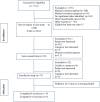A Couples' Based Self-Management Program for Heart Failure: Results of a Feasibility Study
- PMID: 27626029
- PMCID: PMC5004799
- DOI: 10.3389/fpubh.2016.00171
A Couples' Based Self-Management Program for Heart Failure: Results of a Feasibility Study
Abstract
Background: Heart failure (HF) is associated with frequent exacerbations and shortened lifespan. Informal caregivers such as significant others often support self-management in patients with HF. However, existing programs that aim to enhance self-management seldom engage informal caregivers or provide tools that can help alleviate caregiver burden or improve collaboration between patients and their informal caregivers.
Objective: To develop and pilot test a program targeting the needs of self-management support among HF patients as well as their significant others.
Methods: We developed the Dyadic Health Behavior Change model and conducted semi-structured interviews to determine barriers to self-management from various perspectives. Participants' feedback was used to develop a family-centered self-management program called "SUCCEED: Self-management Using Couples' Coping EnhancEment in Diseases." The goals of this program are to improve HF self-management, quality of life, communication within couples, relationship quality, and stress and caregiver burden. We conducted a pilot study with 17 Veterans with HF and their significant others to determine acceptability of the program. We piloted psychosocial surveys at baseline and after participants' program completion to evaluate change in depressive symptoms, caregiver burden, self-management of HF, communication, quality of relationship, relationship mutuality, and quality of life.
Results: Of the 17 couples, 14 completed at least 1 SUCCEED session. Results showed high acceptability for each of SUCCEED's sessions. At baseline, patients reported poor quality of life, clinically significant depressive symptoms, and inadequate self-management of HF. After participating in SUCCEED, patients showed improvements in self-management of HF, communication, and relationship quality, while caregivers reported improvements in depressive symptoms and caregiver burden. Quality of life of both patients and significant others declined over time.
Conclusion: In this small pilot study, we showed positive trends with involving significant others in self-management. SUCCEED has the potential of addressing the growing public health problem of HF among patients who receive care from their significant other.
Keywords: caregiver self-management; caregivers; couples’ chronic illness; couples’ disease management; dyadic behavior change.
Figures
References
-
- Heidenreich P. The CHF-QUERI Executive Committtee. Chronic Heart Failure. Secondary Chronic Heart Failure. (2012). Available from: http://www.queri.research.va.gov/about/factsheets/chf_factsheet.pdf
Grants and funding
LinkOut - more resources
Full Text Sources
Other Literature Sources
Research Materials
Miscellaneous




